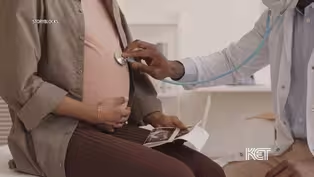
Tips for Avoiding Ticks
Clip: Season 2 Episode 249 | 6m 49sVideo has Closed Captions
Tips for avoiding ticks.
Summer means more time outdoors, which can lead to more exposure to ticks and the diseases they carry.
Problems playing video? | Closed Captioning Feedback
Problems playing video? | Closed Captioning Feedback
Kentucky Edition is a local public television program presented by KET

Tips for Avoiding Ticks
Clip: Season 2 Episode 249 | 6m 49sVideo has Closed Captions
Summer means more time outdoors, which can lead to more exposure to ticks and the diseases they carry.
Problems playing video? | Closed Captioning Feedback
How to Watch Kentucky Edition
Kentucky Edition is available to stream on pbs.org and the free PBS App, available on iPhone, Apple TV, Android TV, Android smartphones, Amazon Fire TV, Amazon Fire Tablet, Roku, Samsung Smart TV, and Vizio.
Providing Support for PBS.org
Learn Moreabout PBS online sponsorshipWell, summer is approaching and the days are getting warmer, which often means more time outdoors.
And that also means more exposure to ticks and tick borne diseases.
And today's medical news, tips on avoiding tick bites and what to do if you are bitten.
Tick season here in Kentucky is generally between the months of May and June, but ticks are active all year round in the state of Kentucky.
It's really important to emphasize that any day above freezing people could encounter ticks in the Bluegrass State.
We have the black like a deer tick, which is feared for its association with Lyme disease.
We have the Lone Star tick, which is associated with the red meat allergy, and then we have the the American dog tick also in the state.
It seems like tick bites are becoming more and more common in Kentucky.
Ticks vector more disease in the state of Kentucky than mosquitoes do.
So they really are one of our big public health menaces.
People are going outside.
They may enter tick habitat or ticks may be brought into their habitat by wild animals or pets ticks.
They like to live in kind of long grassy areas, kind of unkempt areas, places with brush.
They don't want to live necessarily in the middle of your yard or in the middle of a cattle pasture.
They don't like the sun, so they want to be in these kind of hidden out of the way areas where there's also lots of hosts like mice and deer and dogs and things that run through.
So if you enter that habitat, if you're going camping or fishing, if you're doing a lot of weed eating or something in your landscape, it's good to wear insect repellent on your skin.
These are things like deet oil of lemon eucalyptus picaridin, ire, three, five, three, five.
There's lots of different ones available.
DEET is kind of the old standby and it works really well.
The tick hot spots on your body are kind of your lower legs up into your groin area, around your waist, into your belly button, up in your armpits, and then in and around your hair on the nape of your neck.
We encourage people to do tick checks whenever you come in from any outdoor activity.
So checking those tick hot spots.
You can ask a friend or a partner to help.
It's really important to look and find them before they bite.
Most pathogens that are vectored by techs, there is a kind of waiting time before it leaves the ticks body and enters the human.
I would think about looking at the site and figuring out if you can get a pair of tweezers very close to your skin and gripping the tick by its head and then pulling straight up.
You don't want to wiggle the tick out.
You don't want to kind of grip it and rip it.
You don't want to break pieces of the tick off in you, but if you can pull it steadily out, it will pop out.
It'll have resistance.
You can't do it, unplug it from you and then keep it.
Watch the bite wound site to see if there's any rashes that appear around it or if you feel strange, you should be able to take the tick with you to the doctor.
They should be able to identify it or pass it on to somebody who can and figure out what pathogens you may have been exposed to.
Ticks are a problem for pets.
We really encourage people to get flea and tick medicine for their dogs and for their cats and to check them periodically and kind of comb through their hair, especially if they've been rolling around out in the wild.
It's good to take a close look at your pets.
Dogs can acquire Lyme disease.
Cats can pick up various pathogens.
The symptoms would look a little different, but by and large it would be, you might notice some sluggishness with your pet and then you take it to your vet and things will kind of go from there.
May not only marks the start of peak tick season, not coincidentally, it is also Lyme Disease Awareness Month.
Those suffering with Lyme disease often find the journey to a diagnosis and treatment can be long and frustrating.
It's something one Bardstown woman and her family know all too well.
To know where we started.
It's hard to say because people have Lyme symptoms and don't know it.
My husband was having Lyme symptoms back in the nineties and as soon as we moved in he wanted to clear the woods and he kept getting bit by ticks.
He took them off when he got in the shower, you know, and he never told me why he started having all these strange symptoms.
And Lyme is known the symptoms come and go and they move around the body so you can have just digestive issues one week and then the next week have have a frozen shoulder or something like that.
And, you know, doctors are completely clueless.
And when you have symptoms like that, they don't think long.
We still didn't know what was wrong.
It was when our son started getting sick and they tried to diagnose them with M.S.
or another one was ALS, because he had exactly like ALS symptoms he couldn't swallow.
His eyes were burning.
He couldn't even come out of his room because Bright light would just kill his eyes.
He could no longer walk and to use a wheelchair.
So we would take him out every day in that wheelchair to get him outside.
And then it became he was so out of it he couldn't even get in the wheelchair.
And we're pretty much a vegetable.
He couldn't speak to us anymore.
He could try to text us.
He couldn't eat or swallow.
He couldn't even get water.
So then I started investigating even further and I found out you have to see a Lyme doctor.
But I thought, surely infectious disease doctor would be better.
But it wasn't.
They don't know Lyme at all.
So he was getting very violent and stuff.
And so I called his doctor.
I said, Something's wrong.
And he says, I know what it is.
And so he called in some antibiotics for Bartonella, and within a few days it was gone.
And then my daughter started having slowly started having little symptoms.
And I said, Let's get you tested.
She came back CDC positive.
She's the only one that tested positive.
Even Joe and I, as sick as we were, we never tested positive.
So it took eight years and five different tests before Brian finally got a positive Lyme test.
We got better and we reached remission.
But it takes a long time.
It takes like several years and there's a lot to it because Lyme, it affects your hormones, it affects your sleep, it affects your thyroid.
It can affect any organ in your body.
It can get into any tissue and it can affect any system in your body.
Lyme doctors have to learn a lot and have to figure everything out.
What's causing your symptoms?
Symptoms overlap with other co-infections, so they have to be like a real medical detective to figure it out.
And that's what's great about.
The Kentucky Lyme Disease Association works to connect those with Lyme disease, with doctors who specialize in the disease and help sponsor treatments, which can cost up to $10,000.
Community Action Celebrates 60 Years
Video has Closed Captions
Clip: S2 Ep249 | 4m 45s | Community Action celebrates 60 years. (4m 45s)
Federal Grant Helping Hospitals Help Pregnant Women
Video has Closed Captions
Clip: S2 Ep249 | 3m 47s | Federal grant helping hospitals help pregnant women. (3m 47s)
Video has Closed Captions
Clip: S2 Ep249 | 3m 22s | A large solar storm brought the northern lights to the deep south. (3m 22s)
Tackling Mental Health and Drug Addiction in Southcentral Kentucky
Video has Closed Captions
Clip: S2 Ep249 | 2m 23s | Tackling mental health and drug addiction in southcentral Kentucky. (2m 23s)
This Week in Kentucky History (5/13/2024)
Video has Closed Captions
Clip: S2 Ep249 | 1m 57s | This Week in Kentucky History (5/13/2024). (1m 57s)
Providing Support for PBS.org
Learn Moreabout PBS online sponsorship
- News and Public Affairs

Top journalists deliver compelling original analysis of the hour's headlines.

- News and Public Affairs

FRONTLINE is investigative journalism that questions, explains and changes our world.












Support for PBS provided by:
Kentucky Edition is a local public television program presented by KET




